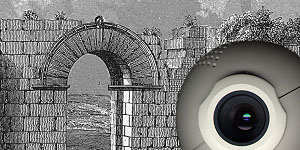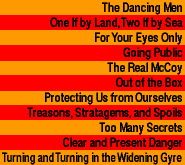


Too Many Secrets
If I can impersonate you, I can destroy your life. With the right identifiers, I can sign contracts in your name, empty your bank accounts, turn you into a bad credit risk, alter your health insurance, cancel your life insurance, and commit crimes in your name. To the systems that govern our lives, I become you.It used to be that locks and safes were enough to protect secrets and that the only ones seriously worried about them were spies, generals, and presidents. Not anymore. With the computer's increasing use, secrecy systems have come to stay. Nowadays all communication is rapidly going electronic. Soon, virtually every communication act except face-to-face meetings will be electronic, and even they might be electronically bugged. The computer has led us to this impasse, but the computer isn't the problem. The problem is secrecy.
We are surrounded by too many secrets---secrets stored in and protecting information in hospitals, banks, insurance companies, communications networks, psychiatric wards, and police departments. They control access to restricted areas and school grades as well as to world currency transactions and nuclear weapons, stock exchanges, and voter-registration rolls. They govern the intimate workings of the government, the mint, the military, air traffic control, food distribution, and power stations. From transportation to energy, from food to currency, from weapons to prisons, breaking into secret systems can lead to smuggling; impersonation; industrial espionage; money laundering; sabotage; terrorism; and economic, military, and political power. Now that computers control weapon systems, secrecy systems have become as important as nuclear weapons. Which is why all governments guard knowledge of them so zealously.
We all swim in an invisible sea of secrets. Visit a bank and you create a file; go to the doctor and you create a file; log on to a computer and you create a file. Transact any kind of business---or file an income tax return, or get counted in a census, or apply for a postal change of address---and you create many files. These files have long been with us, but with the computer's incursion many of the defenses that once protected them from prying eyes---whether the government's or our neighbors'---are gone, or fading fast. Making information electronic while leaving only the old-fashioned protections in place (doors, locks, safes, guns) simply makes it easier to get.
As the earlier discussion of encryption suggests, technology can protect us, but we have to know about it before we can clamor for it. Most of us today know nothing about it so we aren't requesting it from our leaders. In fact, if anything, the reverse is happening. Big business and governments know the value of information. They've been agitating for years to get at all those lovely facts. And so far they're winning.